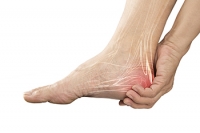 Excessive foot sweating, known as focal hyperhidrosis, is a common but distressing condition. It involves uncontrollable sweating of the feet even when not hot or physically active. Treatments can help manage its impact. Normal sweating occurs when you are hot, exercising, anxious, or nervous, as the nervous system triggers sweat glands to cool the body. Medical conditions, including diabetes, menopause, thyroid problems, and nervous system disorders, can cause excessive sweating of the feet. Some medications may contribute to this as well. While excessive sweating itself does not harm health, it can significantly affect quality of life, causing emotional distress, skin conditions, and discomfort. Diagnosis involves a medical evaluation to rule out underlying causes. Treatment options can include medications, therapy, and in severe cases, surgery. Moderate relief can consist of keeping the feet clean and dry, wearing moisture-wicking socks made from breathable fabrics, and seeking emotional support if needed. If you suffer from excessively sweaty feet, it is suggested that you make an appointment with a podiatrist for a proper evaluation and treatment.
Excessive foot sweating, known as focal hyperhidrosis, is a common but distressing condition. It involves uncontrollable sweating of the feet even when not hot or physically active. Treatments can help manage its impact. Normal sweating occurs when you are hot, exercising, anxious, or nervous, as the nervous system triggers sweat glands to cool the body. Medical conditions, including diabetes, menopause, thyroid problems, and nervous system disorders, can cause excessive sweating of the feet. Some medications may contribute to this as well. While excessive sweating itself does not harm health, it can significantly affect quality of life, causing emotional distress, skin conditions, and discomfort. Diagnosis involves a medical evaluation to rule out underlying causes. Treatment options can include medications, therapy, and in severe cases, surgery. Moderate relief can consist of keeping the feet clean and dry, wearing moisture-wicking socks made from breathable fabrics, and seeking emotional support if needed. If you suffer from excessively sweaty feet, it is suggested that you make an appointment with a podiatrist for a proper evaluation and treatment.
If you are suffering from hyperhidrosis contact Brent Harwood, DPM from Southeast Podiatry. Our doctor can provide the care you need to attend to all of your podiatric needs.
Hyperhidrosis of the Feet
Hyperhidrosis is a rare disorder that can cause people to have excessive sweating of their feet. This can usually occur all on its own without rigorous activity involved. People who suffer from hyperhidrosis may also experience sweaty palms.
Although it is said that sweating is a healthy process meant to cool down the body temperature and to maintain a proper internal temperature, hyperhidrosis may prove to be a huge hindrance on a person’s everyday life.
Plantar hyperhidrosis is considered to be the main form of hyperhidrosis. Secondary hyperhidrosis can refer to sweating that occurs in areas other than the feet or hands and armpits. Often this may be a sign of it being related to another medical condition such as menopause, hyperthyroidism, and even Parkinson’s disease.
In order to alleviate this condition, it is important to see your doctor so that they may prescribe the necessary medications so that you can begin to live a normal life again. If this is left untreated, it is said that it will persist throughout an individual’s life.
A last resort approach would be surgery, but it is best to speak with your doctor to find out what may be the best treatment for you.
If you have any questions please feel free to contact our offices located in Fairhope, Brewton, and Atmore, AL. We offer the newest diagnostic and treatment technologies for all your podiatric needs.








